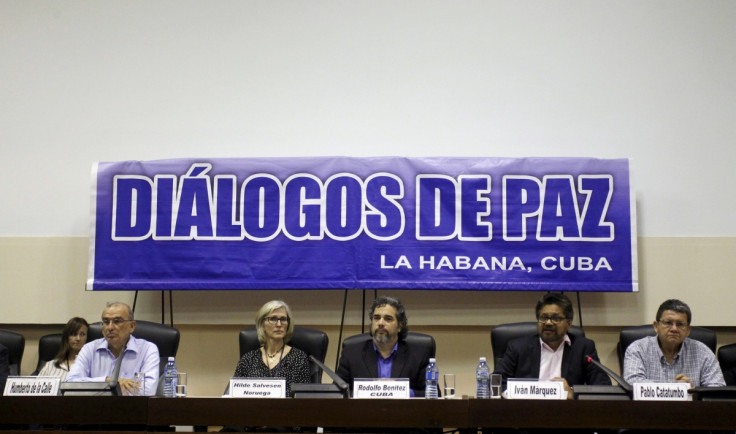Colombia and left-wing Farc guerillas ask for UN mission to oversee disarmament

The Colombian government and left-wing guerrillas from the Farc paramilitary movement have asked the UN to observe the final year of their 50-year armed conflict. The pair, in a rare joint announcement, said that they would ask the security council to oversee a 12-month ceasefire.
Both sides are in Havana, Cuba, for peace talks which are believed to be the final discussions in over three-years of negotiations. They hope to have a peace deal in place by 23 March 2016 and the UN would be contacted after the final deal is confirmed.
The UN has yet to agree to the proposal but its role would help to guarantee any agreed ceasefire and confirm disarmament. Since the start of the negotiations in November 2012 Farc (The Revolutionary Armed Forces of Colombia) has announced a number of unilateral ceasefires that have not been reciprocated by the Colombian government – with President Juan Manuel Santos affirming his belief that the guerrillas need to abandon their armed struggle first.
The conflict has cost an estimated 220,000 lives since it began in 1964 with hundreds being kidnapped to fund the anti-imperialist movement and reports of merciless killings on both sides. It is the longest-running armed conflict in the Western Hemisphere but the parties are coming closer to agreement on divisive issues such as the political role of the rebels, rights for land, drug trafficking and transitional justice.
"We have decided to ask the UN Security Council to create (a mission) of unarmed observers for a period of 12 months," the two sides said in a joint statement at peace talks in the Cuban capital, Havana, according to the BBC.
The Cuban government and Cuban President Raul Castro, brother of Fidel, has assisted with the negotiations. Colombian government lead negotiator Humberto de la Calle, has described the announcement as a "transcendental" moment.
President Santos and the Farc chief Timoleon Jimenez, known as Timochenko, said they wanted an agreement within six months. In May 2015 the guerrilla group suspended the unilateral ceasefire after a military airstrike and land attack killed 26 of its members.
© Copyright IBTimes 2024. All rights reserved.






